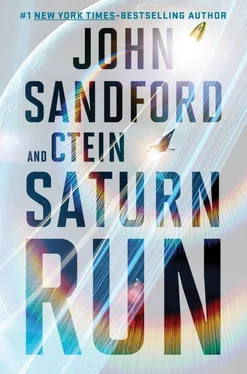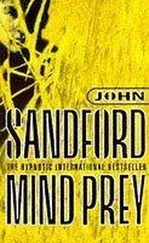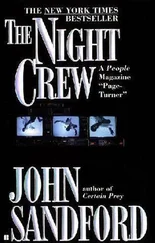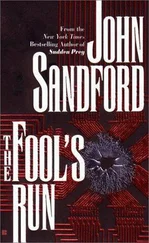“They don’t have the reaction mass,” Fang-Castro told Crow.
“I don’t think so. They’re not going to make orbit.”
The Celestial Odyssey finally began its retro burn. They were as far from Saturn as the moon from Earth, but at their velocity, that was nothing.
Navigation: “Admiral? They’re not correcting their trajectory. Periapsis is dropping. They’re barely going to clear Saturn’s atmosphere.”
“Mr. Crow,” asked Fang-Castro, “do you have any reports of trouble aboard the Celestial Odyssey ?”
“No.” Crow amended himself. “At least, not as of two hours ago.”
“Comm, keep monitoring for a distress call,” Fang-Castro said.
Nav was losing her voice: “They’re still not correcting their periapsis! They’re going to hit the upper atmosphere!”
Martinez: “Oh hell. I’ve got it.” He looked bemused. “They’re crazy. They’re going to try aerobraking.”
Crow: “What?”
“They’re going to try to skim through the atmosphere deep enough that they can shed some velocity through friction. It’s been considered standard operating procedure on any Mars mission. But they’re nuts. Mars is one thing. Saturn’s another. Different atmosphere, different gravity profile, and, uh, three or four times the velocity? It’s nuts.”
Twenty minutes before close encounter, the Celestial Odyssey cut its main engines. Everyone looked at Martinez.
“Oh, yeah, that’s right. They’ve got to get the orientation and angle of attack absolutely perfect. Can’t come in tail-first, they’ll burn off their engines. Even if they get their attitude right, they can’t come in too shallow or they’ll skip along the top of the atmosphere like a stone on a lake. There wouldn’t be enough friction, and they won’t kill enough velocity. On the other hand, if they come in too steep, they’ll just be another meteor.”
The Chinese ship’s image on recon shell’s camera’s IR channel, a bare handful of pixels, had dimmed sharply when the engines cut out and dimmed even more as the engines cooled. Now it began to brighten again.
“Hope they tied down everything good. Aerobraking’s a bumpy ride,” Martinez said. “These boys have got some major balls, I can tell you that.”
Nav: “They are definitely slowing down. They’re shedding significant velocity.”
Fang-Castro: “Enough to put them in a closed orbit?”
“Nowhere near, but probably more than enough, before they’re done, to shed the excess velocity they piled on with that midcourse burn.”
Fang-Castro looked over at Crow, an unvoiced message going between them: Maybe we dodged a bullet.
“Uh-oh, that’s bad,” Martinez said. Fang-Castro and Crow looked back at the display. Trailing the IR blip of the Celestial Odyssey , there were sparkles. Bright pixels that quickly winked out.
“Something’s burned off. Nothing should be burning off,” Martinez said. “They wouldn’t have an expendable heat shield. They figured something wrong. They broke something.”
“Comm, any messages?”
“Nothing, ma’am.”
“Hope they didn’t burn off their comm antennas,” Martinez said.
A minute or so later, the IR image of the Celestial Odyssey started to dim, as it left Saturn’s atmosphere. “Navigation, what’s their trajectory?”
“Still open, ma’am. They don’t have orbit, yet.”
Fifteen minutes passed, then twenty. No call. Nothing. Fang-Castro waited for the Mayday call. Nothing.
The image of the Celestial Odyssey suddenly brightened; simultaneously, Martinez called out, “They’ve started retro burn, again!”
Cheers broke across the bridge.
“Let’s keep the discipline, people,” Fang-Castro said, though she felt like cheering herself. It was space: it made a family of everybody. The President doesn’t get that, she thought. She probably never would.
Zhang Ming-Hoa glanced at the date readout in the corner of his view screen: Tuesday, April 3, 2068. They were a billion, three hundred million kilometers from Earth and orbiting Saturn. That was the good news.
“Mr. Cui, cut those alarms off. They’re not telling me anything I don’t know and they’re making it hard to concentrate,” he said.
The captain of the Celestial Odyssey was a large, stocky man, with a reputation for being imperturbable, bordering on the impassive. He also had a reputation for being something of an irresistible force in the elite Chinese Yuhangyuan Corps. It went with his bulk.
The culture of the Corps favored yuhangyuan— astronauts—who were slight of build. In the early days of Chinese space travel, when each additional kilogram put into orbit greatly increased the cost and difficulty of a mission, this tradition had meant something. Small spacefarers made for smaller, lighter weight spacecraft. The Chinese space program could not have advanced as rapidly as it did with average or larger-than-average yuhangyuan .
That was decades in the past, but tradition changed slowly. The only group that put more of a premium on small size and weight were racing jockeys. Zhang’s imperturbability, merged with single-mindedness, had carried him through the training academy without any disciplinary incidents, despite the hazing of his classmates. The nicest nickname he’d ever had there was “big ox.”
His instructors, despite their skepticism over his physical suitability, knew officer material when they saw it. Faced with difficulty and even outright hostility, Zhang remained calm, quiet, and thoughtful. Very little fazed him.
For that reason, the bridge crew began to worry when he repeatedly muttered the obscenity ta ma de to himself. That was more what they expected of First Officer Cui. Cui Zhuo better fit the image of the stereotypical yuhanguan : she was small and wiry, even by Corps standards, and entirely perturbable. Where Captain Zhang carefully pondered a course of action, First Officer Cui responded instantly and instinctively.
Her quick reactions were also what stood between her and a captaincy. Within hours of entering the academy, an upperclassman, noting her unusually slight build and reddish brown hair, dubbed her “Mouse.” Within a day that had changed to “Ferret,” and freshman Cui had the classes’ first disciplinary mark.
Her instructors noted her ability to command respect, but felt she needed thorough tempering before she’d be ready for command of her own. She wasn’t there, yet.
The alarms died, and Zhang said to Cui, “Well, we’re alive, anyway. For now. Is there any other good news?” He looked to Navigation. “Mr. Sun, what do you have for me?”
Sun checked her console. “We are in orbit about Saturn, sir. The aerobraking maneuver and retro burn were… successful.”
“You don’t look very happy, Lieutenant. I take that to mean it’s not a very good orbit.”
“I’m afraid not, sir. It’s very eccentric—we’re barely captured. Apoapsis will be, umm, about half a million kilometers. It’ll be about two days before we make a close pass by Saturn again and can do another retro burn to circularize our orbit.”
“Cui, you and Peng look even less happy than our navigator. Enlighten me.”
The first officer and helmsman had been worriedly conferring over his console. Cui looked up.
“Sir, the external tanks took a lot of damage during aerobraking. One or more of them may be repairable, but we’ve lost what reaction mass they still had. That’s about six hundred tonnes of liquid hydrogen gone. The internal tanks won’t provide enough delta-vee to get us into a proper orbit and rendezvous with the alien operation. We’re going to need to aerobrake again on the return pass, to shed enough velocity.”
Читать дальше








